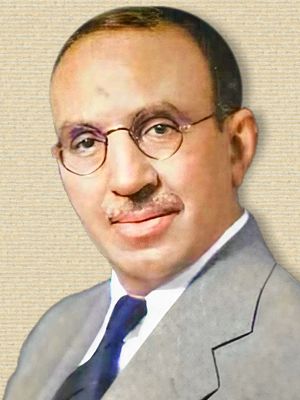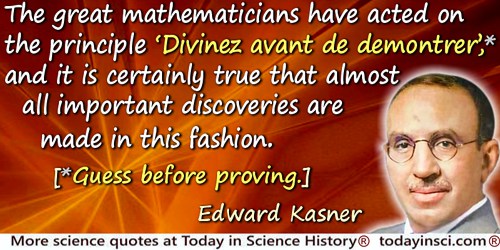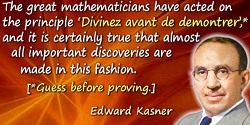 (source)
(source)
|
Edward Kasner
(2 Apr 1878 - 7 Jan 1955)
American mathematician who introduced the word googol, invented by his 9-yr-old nephew, for a very large number (10 raised to the power 100, which is a 1 followed by 100 zeroes). Kasner discussed the term in a non-technical mathematical book he co-wrote with James R. Newman, Mathematics and the Imagination (1940).
|
Science Quotes by Edward Kasner (10 quotes)
If a mathematician of the past, an Archimedes or even a Descartes, could view the field of geometry in its present condition, the first feature to impress him would be its lack of concreteness. There are whole classes of geometric theories which proceed not only without models and diagrams, but without the slightest (apparent) use of spatial intuition. In the main this is due, to the power of the analytic instruments of investigations as compared with the purely geometric.
— Edward Kasner
In 'The Present Problems in Geometry', Bulletin American Mathematical Society (1906), 286.
Mathematics … is man’s own handiwork, subject only to the limitations imposed by the laws of thought.
— Edward Kasner
With co-author James R. Newman, in Mathematics and the Imagination (1940), 359.
Mathematics is often erroneously referred to as the science of common sense. Actually, it may transcend common sense and go beyond either imagination or intuition. It has become a very strange and perhaps frightening subject from the ordinary point of view, but anyone who penetrates into it will find a veritable fairyland, a fairyland which is strange, but makes sense, if not common sense.
— Edward Kasner
With co-author James R. Newman, in Mathematics and the Imagination (1940), 359.
Mathematics is the science which uses easy words for hard ideas.
— Edward Kasner
With co-author James R. Newman, in Mathematics and the Imagination (1940), 4.
Perhaps the greatest paradox of all is that there are paradoxes in mathematics.
— Edward Kasner
With co-author James R. Newman, in Mathematics and the Imagination (1940), 193.
The great mathematicians have acted on the principle “Divinez avant de demontrer”, and it is certainly true that almost all important discoveries are made in this fashion.
— Edward Kasner
In 'The Present Problems in Geometry', Bulletin American Mathematical Society, 11, 285. [The French phrase has the sense of “Guess before proving”. —Webmaster]
The problems of the infinite have challenged man’s mind and have fired his imagination as no other single problem in the history of thought. The infinite appears both strange and familiar, at times beyond our grasp, at times easy and natural to understand. In conquering it, man broke the fetters that bound him to earth. All his faculties were required for this conquest—his reasoning powers, his poetic fancy, his desire to know.
— Edward Kasner
With co-author James R Newman, in 'Beyond the Google', Mathematics and the Imagination (1940), 35.
The testament of science is so continually in a flux that the heresy of yesterday is the gospel of today and the fundamentalism of tomorrow.
— Edward Kasner
With co-author James R. Newman, in Mathematics and the Imagination (1940), 193.
We have overcome the notion that mathematical truths have an existence independent and apart from our own minds. It is even strange to us that such a notion could ever have existed.
— Edward Kasner
With co-author James R. Newman, Mathematics and the Imagination (1940), 359.
When the mathematician says that such and such a proposition is true of one thing, it may be interesting, and it is surely safe. But when he tries to extend his proposition to everything, though it is much more interesting, it is also much more dangerous. In the transition from one to all, from the specific to the general, mathematics has made its greatest progress, and suffered its most serious setbacks, of which the logical paradoxes constitute the most important part. For, if mathematics is to advance securely and confidently, it must first set its affairs in order at home.
— Edward Kasner
With co-author James R. Newman, in Mathematics and the Imagination (1940), 219.
See also:
- 2 Apr - short biography, births, deaths and events on date of Kasner's birth.
- Mathematics and the Imagination, by Edward Kasner and James Newman. - book suggestion.



 In science it often happens that scientists say, 'You know that's a really good argument; my position is mistaken,' and then they would actually change their minds and you never hear that old view from them again. They really do it. It doesn't happen as often as it should, because scientists are human and change is sometimes painful. But it happens every day. I cannot recall the last time something like that happened in politics or religion.
(1987) --
In science it often happens that scientists say, 'You know that's a really good argument; my position is mistaken,' and then they would actually change their minds and you never hear that old view from them again. They really do it. It doesn't happen as often as it should, because scientists are human and change is sometimes painful. But it happens every day. I cannot recall the last time something like that happened in politics or religion.
(1987) -- 


